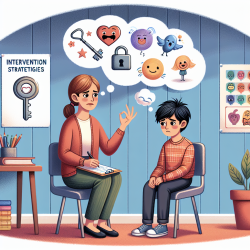Recent research has shed light on the significant barriers faced by minority-language speakers with neurodevelopmental disorders (NDDs) in accessing and utilizing healthcare services. The scoping review titled "Barriers to access and utilization of healthcare services for minority-language speakers with neurodevelopmental disorders: A scoping review" provides valuable insights into these challenges and suggests actionable solutions to improve outcomes for this vulnerable population. As practitioners, it is imperative to integrate these findings into our practice to ensure equitable healthcare access and outcomes for all children.
Understanding the Barriers
The review identifies several key barriers that minority-language speakers with NDDs and their families encounter:
- Systems-level barriers: These include a disconnect between the needs of users and the services offered, lack of training for healthcare professionals, difficulties accessing interpreters, and a lack of available information in minority languages.
- Provider-level barriers: Practitioners often hold erroneous beliefs regarding language development in minority-language children with NDDs, fail to use evidence-based practices, and face challenges in offering family-centered services.
- Family experience barriers: Families often experience feelings of distrust toward healthcare providers who do not speak their minority language and face stigma when utilizing healthcare services.
Implementing Solutions
To address these barriers, the review suggests several key areas for improvement:
1. Policy Development and Implementation
Healthcare systems need to develop and implement policies that support minority-language speakers. This includes increasing the number of bilingual practitioners, ensuring the adoption of evidence-based clinical guidelines, and removing policy contradictions that hinder best practices.
2. Practitioner Training
Mandatory training for practitioners is essential to improve their understanding of bilingual language development and cultural competency. Universities and employers should ensure that healthcare professionals receive appropriate training during their education and throughout their careers.
3. Referral Pathways
Practitioners should refer minority-language children with suspected speech or language disorders to specialists who are experienced in working with this population. Collaborative multidisciplinary frameworks can facilitate appropriate referrals and improve service delivery.
4. Access to Tools and Resources
Practitioners need access to trained interpreters and appropriate screening and assessment tools in multiple languages. Employers must ensure that practitioners have the time and resources to implement best practices effectively.
5. Partnership with Caregivers
Engaging caregivers as partners in the healthcare process is crucial. Stakeholder engagement activities can help identify barriers and develop solutions tailored to specific contexts. Supporting caregivers through training and involving them in the intervention process can empower them and improve outcomes for their children.
Encouraging Further Research
While the review provides valuable insights and solutions, further research is needed to examine the efficacy of these proposed solutions in different regions and healthcare contexts. Additionally, there is a need for more studies that capture the first-person perspectives of individuals with NDDs.
To read the original research paper, please follow this link: Barriers to access and utilization of healthcare services for minority-language speakers with neurodevelopmental disorders: A scoping review.










